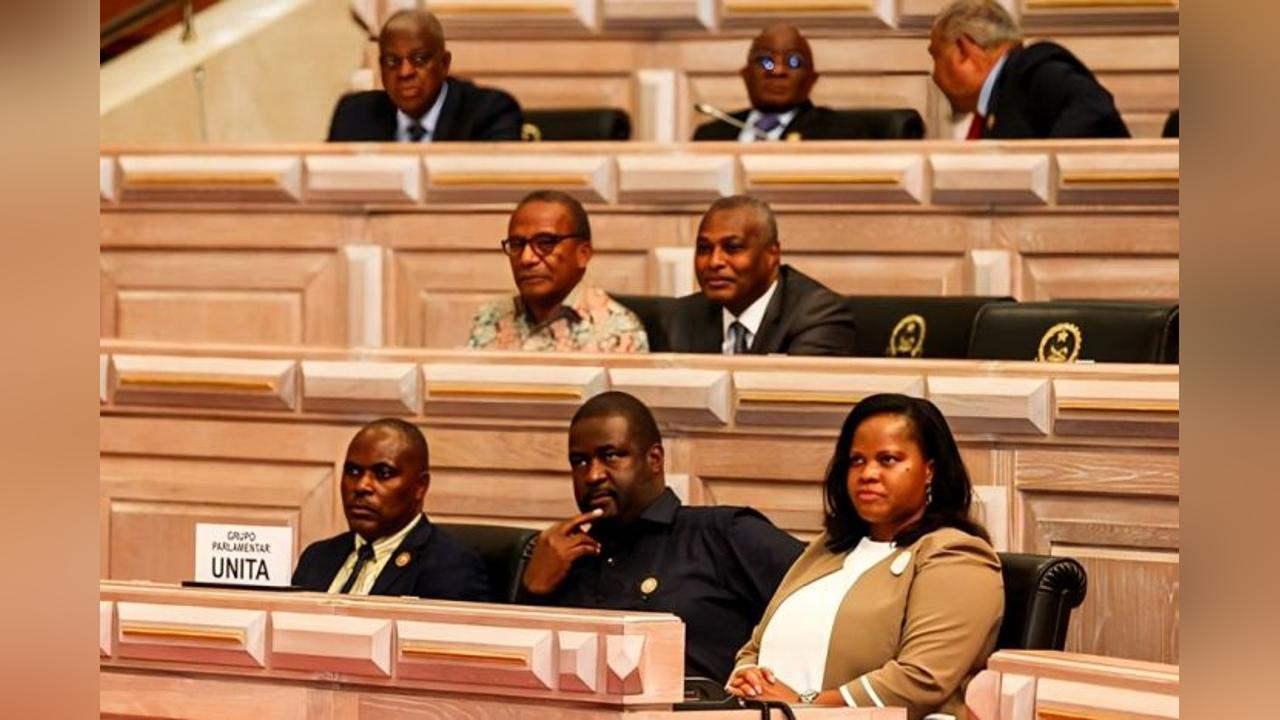Africa-Press – Angola. The consensual approval of the new Legislative-Electoral Package, with no votes against or abstentions, was presented as a sign of political maturity in Parliament. However, interpretations differ among the main political contenders – with the MPLA (Brazilian Popular Movement) assuring that the new rules dispel any doubts, while UNITA insists that there are still “facts” that compromise transparency, particularly regarding the composition of the National Electoral Commission (CNE).
For the MPLA, the fact that there were no votes against or abstentions was a clear sign that the parties involved agreed with the text of the document now approved.
This was emphasized by Esteves Hilário, MPLA’s deputy and secretary for information and propaganda of the Political Bureau, when he stated that the approval resulted from the combination of proposals from the Executive and UNITA, “in an exercise that allowed for consensus.” “The approval of the legislative-electoral package was consensual. There were no votes against or abstentions. This shows that everyone agreed with the approved rules,” the parliamentarian stated.
Esteves Hilário argued that the new rules “should dispel any doubts” regarding the electoral process, highlighting that the Constitutional Court itself had already rejected UNITA’s claims regarding the unconstitutionality of the CNE’s composition model.
The deputy refuted UNITA’s claim that the d’Hondt method should be applied to the distribution of commissioners to the body organizing the electoral process, recalling that “this method is used for legislative mandates and not for electoral bodies.”
“The majority principle applies at the CNE: whoever has the majority must also have the majority in the body. It’s simple. UNITA knows this, but insists on raising suspicions that it has never proven,” he stated.
For the MPLA, the approved package constitutes an opportunity for political stabilization.
“Since 2017, UNITA has been talking about parallel counts with different results, but has never presented any evidence. For our part, we believe in the integrity of the process, in the institutions, and in global democratic standards,” he concluded.
“These are not suspicions, they are facts,” says UNITA
In the opposite direction, Faustino Mumbika, deputy and secretary for Electoral Affairs of UNITA, relativized the idea of total consensus.
“Some consensus has been reached, but significant differences remain. In fact, UNITA’s allegations are not mere suspicions; they are facts. Cases of multiple registrations of dead voters in the registers and discrepancies between registered voters and voters,” he emphasized.
Faustino Mumbika, a member of the ‘black rooster’ board, was also the proponent of the Bill presented by UNITA.
He spoke to this newspaper about the progress made during the specialized discussions on this legislation, such as the permanent opening of the deadline for complaints regarding voter registration and the possibility of publishing results by municipality. However, he warned that there are still “serious weaknesses” related to access to voter lists and the final vote count.
“The resistance to publishing voter lists limits oversight. Furthermore, we continue to have generic results, without the full possibility of verification and comparison table by table. This undermines citizens’ trust,” he criticized.
Referring to the CNE, the deputy insisted that the composition of that body “continues to unfairly penalize his party.”
“The law provides for a combination of the majority principle and respect for minorities. Under the d’Hondt method, UNITA would be entitled to more than four commissioners, but the MPLA insists on maintaining an absolute majority in the body. Therefore, we appealed to the Constitutional Court and do not rule out recourse to international bodies,” he said.
Despite the differences, the deputy guaranteed that UNITA’s strategy for 2027 will not be harmed.
“It’s the citizens at the polls who determine the outcome. If we’re well organized, massive voter turnout can thwart any attempt at manipulation. The new package creates the minimum conditions for a slightly better process than previous ones, especially with the clarification that citizens must be present within 200 meters of polling stations and the introduction of proof of life,” he emphasized.
Faustino Mumbika, a member of the ‘black rooster’ board, was also the proponent of the Bill presented by UNITA.
He spoke to this newspaper about the progress made during the specialized discussions on this legislation, such as the permanent opening of the deadline for complaints regarding voter registration and the possibility of publishing results by municipality. However, he warned that there are still “serious weaknesses” related to access to voter lists and the final vote count.
“The resistance to publishing voter lists limits oversight. Furthermore, we continue to have generic results, without the full possibility of verification and comparison table by table. This undermines citizens’ trust,” he criticized.
Referring to the CNE, the deputy insisted that the composition of that body “continues to unfairly penalize his party.”
“The law provides for a combination of the majority principle and respect for minorities. Under the d’Hondt method, UNITA would be entitled to more than four commissioners, but the MPLA insists on maintaining an absolute majority in the body. Therefore, we appealed to the Constitutional Court and do not rule out recourse to international bodies,” he said.
Despite the differences, the deputy guaranteed that UNITA’s strategy for 2027 will not be harmed.
“It’s the citizens at the polls who determine the outcome. If we’re well organized, massive voter turnout can thwart any attempt at manipulation. The new package creates the minimum conditions for a slightly better process than previous ones, especially with the clarification that citizens must be present within 200 meters of polling stations and the introduction of proof of life,” he emphasized.
“For the FNLA, the law has evolved, but the practice is different”
Representative Nimi a Nsimbi, president of the “brothers’ party,” took a middle ground. For him, the electoral reform represents “a positive step,” but insufficient to dispel all doubts. “Compared to previous documents, there has been progress. On the legal level, some guarantees have been created. But the published law is one thing, and practice is another. And practice often leaves much to be desired,” he warned.
Regarding the controversial distribution of commissioners in the National Electoral Commission, Nimi a Nsimbi admitted that UNITA has technical grounds for its complaints.
“As a statistics professor, I can say that, in terms of discrete quantitative variables, UNITA is right, because the data has evolved and should also be reflected in the composition of the CNE,” he added, before adding that, however, based on the arithmetic calculation advocated by the MPLA, there is also coherence.
“We are faced with two possible readings,” he explained.
Still, the FNLA president acknowledges that the reforms could bring improvements to the domestic electoral landscape. “In some areas, yes, there has been progress. But doubts persist and concern the FNLA. The true test will be in practice in 2027,” he concluded.
Civil Society discusses risks in implementing the new law
The newspaper OPAÍS also heard from two prominent members of civil society, Luis Jimbo, an expert in elections and conflict resolution, and Serra Bango, coordinator of the Justice, Peace and Democracy Association (AJPD), who also expressed their concerns regarding the new electoral regime.
And, although they recognize that the approval of the laws by consensus among the main parties represents progress, both warn that the greatest challenges lie in the practical application of the rules and the conduct of electoral management bodies.
For Luis Jimbo, for example, consensus does not guarantee the transparency of the act.
Furthermore, he noted that the consensual approval of electoral laws does not, in itself, guarantee free, fair, and transparent elections. “We can’t claim that this law will guarantee transparent elections. That will depend on the law’s enforcers, the electoral management bodies,” he emphasized, recalling that, in addition to the CNE, the Executive also plays crucial roles, such as in the voter registration process. The expert warns that replacing the voter card with the Identity Card (BI) could create new vulnerabilities, especially since many voting-age citizens do not have an up-to-date ID.
“If this doesn’t happen, it will create suspicion in the electoral process,” he warned, before pointing to the risks of exclusion and future challenges.
Another critical point raised by Luís Jimbo concerns election observation. Although the law allows observers to be present in CNE plenary sessions, he believes the measure violates the principles of independence and impartiality. “Observers cannot sit in a CNE Deliberative Assembly. If that happens, they become part of the problem,” he emphasized.
The expert also criticized the limitations imposed by the current model, which restricts the presence of observers to just three per province, which, he said, distorts the essence of oversight. “Observation is not tourism; it is a professional and technical service to enhance the credibility of the electoral process,” he noted.
“Fraud arises from the administration of the process”
Serra Bango, in turn, argued that laws, in and of themselves, don’t directly create room for fraud, but rather the way they’re administered. “When it comes to electoral fraud, it’s the way the process is conducted. It’s not compliance with the law that creates fraud, but rather the mismanagement of the process,” he emphasized.
The AJPD coordinator cited the practice of 2012 and 2017, when party delegates were accredited only 24 hours before the election, making monitoring at more distant polling stations difficult. “If a party doesn’t have a party delegate present, anything can happen. This is logistical fraud,” he explained.
Identity Card Vulnerabilities
Serra Bango also expressed concern about the decision to allow voting with just an ID card, without the need for a voter registration card. He believes the fragility of this document’s issuance could facilitate fraud.
“Our identity cards are easily forged. There have been cases of foreign citizens voting using typically Angolan names. This is a huge risk,” he warned.
As an alternative, the lawyer advocates strengthening in-person voter registration, which would allow for greater control and verification of voters’ identity and nationality.
Social communication and inequalities
On the other hand, Serra Hango pointed to the behavior of the media, which he considers “systematically favors the ruling party,” and the unequal distribution of campaign funding. “Disproportionate access to the media and public funds creates an environment of unfair competition,” he stated.
Both Luís Jimbo and Serra Bango agree that the biggest problem lies not only in the text of the law, but above all in political ethics, administrative transparency, and the logistical capacity of the bodies responsible for managing the electoral process.
For both, without a committed, impartial and efficient electoral administration, the legislative consensus reached in Parliament may prove insufficient to ensure that the 2027 elections are, in fact, fair, transparent and credible.
What changes with the new electoral package?
The approved Legislative-Electoral Package brings together proposals from the Executive and UNITA, and was discussed in detail before final unanimous approval. Key points include the introduction of unofficial voter registration, with complaints no longer limited to 15 days and now available throughout the entire process; the introduction of proof of life requirements, to prevent deceased citizens from remaining on the voter rolls; and transparency, which will allow citizens to remain up to 200 meters from polling stations, ensuring greater monitoring of the posting of results.
Also, the determination to publish results by municipality on the CNE website, although UNITA argues that it should also be by polling station; the composition of the CNE, which maintains the predominance of the majority principle in the distribution of commissioners.
angola24
For More News And Analysis About Angola Follow Africa-Press






